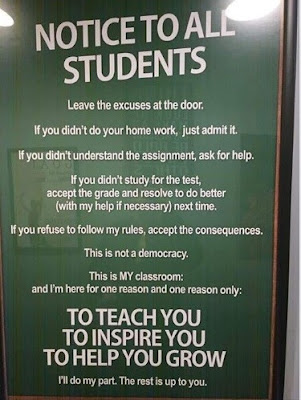Do you REALLY want to hang that poster? Creating Civic and Collaborative Spaces
by Mary Ellen Daneels, Lead Teacher Mentor
There is a new teacher poster that is making the rounds on social media (see image to the left). I would say that the majority seem to “like” the message of the piece. I dissent.
The poster reads:
NOTICE TO ALL STUDENTS
Leave the excuses at the door.
If you didn’t do your homework, just admit it.
If you didn’t understand the assignment, ask for help.
If you didn’t study for the test,
Accept the grade and resolve to do better
(with my help if necessary) next time.
If you refuse to follow my rules, accept the consequences.
This is not a democracy.
This is MY classroom,
And I’m here for one reason and one reason only:
TO TEACH YOU
TO INSPIRE YOU
TO HELP YOU GROW
I’ll do my part. The rest is up to you.
NOTICE TO ALL STUDENTS
Leave the excuses at the door.
If you didn’t do your homework, just admit it.
If you didn’t understand the assignment, ask for help.
If you didn’t study for the test,
Accept the grade and resolve to do better
(with my help if necessary) next time.
If you refuse to follow my rules, accept the consequences.
This is not a democracy.
This is MY classroom,
And I’m here for one reason and one reason only:
TO TEACH YOU
TO INSPIRE YOU
TO HELP YOU GROW
I’ll do my part. The rest is up to you.
I have to admit, I connect with the frustration and issues the poster addresses. I would also say that at one point in my practice, on a very bad day, I might have considered hanging this up in my classroom. But now, when I reflect on this image, I am sad for both the teacher and students in the classroom where this hangs. I think “right problem, wrong solution.”
Is it important for students to take responsibility and ownership of learning? Yes. Is it important to have clear norms and expectations of how the classroom will be run? Yes. Is this poster the way to create a civic and collaborative space for learning and engagement? I say no.
One of the proven practices of civic education is the role of student voice in school governance. The Guardian of Democracy report states, “A long tradition of research suggests that giving students more opportunities to participate in the management of their own classrooms and schools builds their civic skills and attitudes.” This poster silences student voice and emphatically declares, “this is not a democracy,” implying student participation in classroom management is not welcome.
In my experience, if you are the benevolent dictator of your classroom, you are missing a vital learning opportunity for students to experience the power of democratic processes to address the essential question, “How should we live together?” in the classroom and in society at large.
Further, when self-advocacy in times of difficulty is seen as “an excuse”, or worse, insubordination, we, as teachers, are doing our students a disservice and ignoring our responsibility to, as the poster says, “teach, inspire, and help students grow.”
If you choose to set the tone for the year with the statement, “this is MY classroom,” you absolve students of any pride or ownership of success. They are simply there to do what they are told. This goes completely against “establishing a culture of learning” per the Danielson Framework for Effective Teaching and other best pedagogical practices that prepare students for college, career, and civic life.
Speaking of best practice, how does this poster align with Social Emotional Learning Competencies? What about Culturally Responsive Teaching practices? How well does this poster support the tenents of Restorative Justice? What message does this poster send about privilege and power, especially to students systematically impacted by the civic empowerment gap? Meira Levinson, in her widely acclaimed 2012 book Leave no Citizen Behind, outlines a "...profound civic empowerment gap...between ethnographical minority, naturalized, and especially poor citizens, on one hand, and white, native-born, and especially middle-class and wealthy citizens on the other."
ALL educators are civic educators. The way we run our schools, our classrooms, the climate we create with our practices and policies all send messages students about power, identity, equity, justice — key concepts that are core to civics. To ignore the role of democratic classroom practices that engage students in the management of their classrooms and schools denies them the opportunity to build their civic skills and attitudes. To this end, these undemocratic practices widen the civic empowerment gap and do a disservice to the civic mission of schools.
So, what can replace this poster? How can we create a civic and collaborative space for students to thrive during the school year in which clear norms and expectations are clearly defined to create mutual respect and responsibility for learning? Here are some alternatives.
- Facing History and Ourselves have created a Back-to-School Toolkit for building classroom community.
- Reframing Classroom Management: A Toolkit for Educators from Teaching Tolerance, “offers educators a variety of tools to help demystify common behaviors and reinforce what works”.
- Cult of Pedagogy has numerous resources around Classroom Management to inspire your back to school plans.
- Edutopia has a cornucopia of blogs, videos, tips, and tricks to establish classroom norms.
- In the Teaching Channel blog, “Building Democratic Classrooms: Every Teacher Can Cultivate Civic Competencies,” Heather Van Bethuysen shares how to breathe civic life into all classrooms.





Comments
Post a Comment